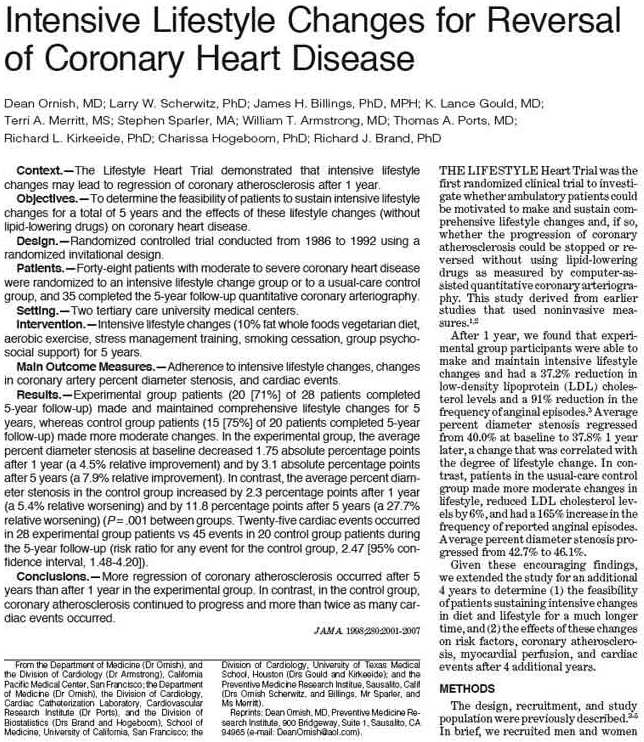
scientific advances in atherosclerosis
#31
Posted 10 December 2011 - 05:04 PM
#32
Posted 10 December 2011 - 11:09 PM
So, so far nothing makes the plaque smaller
This claims a 2.2% reduction after 1 year.

#33
Posted 11 December 2011 - 01:17 AM
So, so far nothing makes the plaque smaller
That might depend on what you mean by plaque. William Davis reports substantial reductions in calcium scores as measured radiographically. Whether that's a reduction in plaque or a 'decalcification' which might be transient, I don't know. There was the pomegranate paper of a couple years ago that saw improvements in IMT and FMD, IIRC. Again, this may not exactly be 'plaque'...
#34
Posted 11 December 2011 - 01:56 AM
The Track Your Plaque 5 Stages of Reversal
I break the course of tracking plaque down into five distinct phases, what I call “The Track Your Plaque 5 Stages of Reversal”:
Stage 1 Deceleration: Slowing plaque growth to ≤30% per year
It’s an unambitious goal, but a modest effort can slow growth to below the “natural” rate of 30% annual growth. This is the rate of growth experienced by many people who take statin cholesterol drugs (Lipitor®, Zocor®, etc.) as a sole strategy for combating heart disease. Slowing growth to less than 30% per year is regarded as an unsatisfactory result in the Track Your Plaque program, one that can be improved substantially. While this represents an improvement over natural or accelerated plaque growth, substantial risk for heart attack persists with this level of growth.
Stage 2 Deceleration: Slowing plaque growth to ≤20% per year
A modest reduction in heart attack risk occurs when growth of plaque is slowed to 20% or less per year, but remains above 10%. Stage 2, like Stage 1, is also a typical result for someone who does nothing but adds a statin cholesterol drug and follows a conventional (e.g., American Heart Association low-fat) nutritional program. While existing data suggests that achieving Stage 2 Deceleration modestly reduces the risk of heart attack and the likelihood of heart procedures, there’s plenty of room for improvement.
Stage 3 Deceleration: Slowing plaque growth to ≤10% per year
Now we’re starting to have a real impact. When plaque grows at 10% or less per year, it hasn’t stopped, but has slowed considerably from its “natural” rate of growth. Plaque growth rates of 10% or less per year are associated with a substantial reduction in heart attack. Achieving this rate of growth should prompt the question, “What could I do just a little bit better?”
Stage 4 Zero Growth: Zero percent plaque growth per year
This means that plaque growth has halted. Even though plaque has not reversed, zero percent plaque growth is associated with a dramatic reduction in the risk of a heart attack (Raggi 2005). This is probably due to the fact that, while calcium has not changed, the active elements in plaque, like inflammatory cells and fatty material, have been reabsorbed, resulting in reduced potential for plaque rupture. In my experience and in published experience, the likelihood of a heart attack is virtually zero at this stage.
Stage 5 Reversal: Reducing your heart scan score
This is the "holy grail," the goal we seek. It’s the prize that has tantalized the hopeful who’ve been misled into dead ends like low-fat diets, chelation, and other blind alleys. When achieved in the Track Your Plaque program, it is truly an enormous personal success that I would equate with graduating college, getting married, or being cured of cancer.
Reducing your heart scan score signifies that coronary atherosclerotic plaque has reversed—it is smaller in volume. All the components of plaque have diminished, including inflammatory cells, fatty tissue, and calcium. It also means that plaque has been essentially inactivated, its potential for rupture virtually shut down. It also means that your risk for heart attack is zero. In other words, in all practicality, heart disease risk has been eliminated. It also means that, although plaque is still present, the fatty portion of plaque has been replaced by solid structural tissues that allow plaque to exist quietly without inflammation and without activity that triggers rupture. A decreasing heart scan score provides powerful indirect evidence that plaque is becoming stable and inactive.
In my experience, the majority of people who adhere to Track Your Plaque can slow or completely stop the otherwise inevitable increase in score, though the time required to do so may vary. In the first year, if all the proper steps are taken, a very realistic goal is to achieve an increase in score of no more than 10% (Stage 3 Deceleration). The existing data suggest that a score increase of <10% represents low-risk, and heart attack becomes less and less likely as your plaque is inactivated.
A zero-percent increase or decrease in score is more commonly encountered after two years on this program. Obtaining a reduction of score with present treatments is therefore a one to two year long process for most participants.
It is important to point out that the lower your starting score, the more easily it is reduced. Scores of 200 or less have a much greater chance of being lowered in the first year than scores >200. In our program, 70% of people with starting scores of <200 succeed in the first year. This drops to 30% success in the first year if your score is >200, 50% by end of year 2. The message here is clear: the earlier you start to Track Your Plaque, the more control you will have over your heart’s future. Nonetheless, if you start with a higher score, don’t give up hope. You may have to work harder and be patient, since this process requires at least two years for most people to enjoy substantial score-reducing or slowing effects.
Certain groups of people can anticipate greater difficulty in controlling their score. People with established diabetes will encounter more of a struggle. Unfortunately, if you’ve already been diagnosed with diabetes, reducing your score is less likely. The Track Your Plaque principles still do represent the most powerful prevention program you can follow, but it is more likely that you simply “decelerate” your plaque growth with these efforts, rather than achieve score reduction as long as you remain diabetic. (However, we will discuss how diabetics can supercharge their plaque control effort using our unique Track Your Plaque nutrition principles that reduce the diabetic tendency, many times reverse it!)
People with the metabolic syndrome who have a combination of low HDL, high triglycerides, high blood pressure, blood sugar levels >110 mg/dl, and are overweight, will also struggle to control plaque. The metabolic syndrome generally precedes the onset of full-blown diabetes but has a similar, though lesser, impact on plaque. The most powerful tool for control of plaque growth for many people like this is weight-loss achieved through the strategies discussed later in our Track Your Plaque Nutritional Principles. It is possible to control plaque with uncorrected metabolic syndrome in the picture, but it can be considerably more difficult.
Once score stabilization (zero change) or reduction is achieved, the need for any future scans to detect additional change is really an individual decision. Since the score has started to drop, the most important goal has been achieved. It is worth considering another scan, however, if there is some significant change in your program. For instance, significant weight gain, reversal of diabetes, or a prolonged period of treatment interruption are among reasons for repeating a scan despite initial control of the score.
The Track Your Plaque Study In 2008, along with nutrition scientist, Dr. Susie Rockway, and statistician, Dr. Mary Kwasny, both of Rush University Medical Center, we published a portion of the Track Your Plaque experience (Davis 2008).
In this group of 45 participants, within 18 months 20 participants achieved a reduction in heart scan score of 14.5% (mean), while 22 participants experienced zero change in score. Of the 45 participants, only 3 experienced an increase in score. One participant, a 52-year old woman, achieved an incredible 64% reduction in heart scan score, our best outcome to date.
In other words, 42 of 45 participants, or 93%, for all practical purposes eliminated risk for heart disease by halting or reducing their heart scan scores.
Why such a small number of participants? Actually, prior to publication of this study, we had enrolled several hundred people in the program. But once vitamin D was added to the Track Your Plaque program, we began to witness faster and larger reductions in heart scan scores in a greater proportion of participants. So this small study included only the modest number of participants who had been taking vitamin D for the duration of the study, but did not report the several hundred people who had participated “pre-vitamin D.” (There’s much more on the crucial role of vitamin D in plaque control later in the book.)
Since publication of the study, we have improved the Track Your Plaque program even further by adding new strategies that have potential to achieve even greater reductions in heart scan score in more people. More on that to come.
Copyright 2010 Track Your Plaque, LLC
Edited by Michael, 19 February 2012 - 12:43 PM.
#35
Posted 11 December 2011 - 02:48 AM
Well I haven't verified but pomegranate has been said to not only slow atherosclerosis but to reverse it. Somewhere I heard that 1500mg per day of vitamin C can start clearing atherosclerosis based on guinea pig studies, though this also has to be verified.(both of these have also been mentioned in this thread by others, iirc)Does anyone knows of what is being done about the topic of destruction of atherosclerotic plaques. I know about dietary regimens, suggested from doctors (profilaxy) and medications, that lower the blood cholesterol (profilaxy), but what about the treatment? is there a medication, that removes the cholesterol plaques, once after they are created?
On the other cholesterol thread(link), I showed that Dr. Eades seems to've been able to get stratospherically high multi-statin+diet resistant cholesterol 750! trygliceride 3000! down into normal range(cholesterol 186 tryglicerides 86) drug free.
her serum cholesterol was 750 mg/dl (milligrams/deciliter)—normal is anything below 200 and her triglycerides (another blood fat usually measured in the 100-to-250- mg/dl range) were a whopping 3,000 mg/dl!...
So it’s no surprise that her doctor—following standard medical protocol—completely bypassed Step One and immediately started her on the National Cholesterol Awareness Program Step-Two Diet and two potent cholesterol-lowering medications...
Jayne faithfully followed her doctor’s orders for six months, although not without difficulty. The medications nauseated her, and the diet kept her constantly hungry...she had improved some, but not nearly enough. Her cholesterol had dropped from 750 mg/dl to 475 mg/dl and her triglycerides from 3,000 mg/dl to 2,000 mg/dl—an improvement to be sure, but still cause for great concern to both Jayne and her physician.
We instructed Jayne to stop taking both of her cholesterol-lowering medications and to change her diet drastically...new nutritional regimen...
We told her to call in three weeks to check in and to come back to have her blood checked in six weeks...
The results of her blood work astounded her. Jayne’s cholesterol level had fallen to 186 mg/dl and her triglycerides to 86 mg/dl...- Protein Power
Calorie Restriction practioners are said to've blood pressure of a 10 year old, ideal blood cholesterol parameters, minimal inflamation parameters(10 fold decrease), some aspects of cardiovascular health akin to someone 20 years younger.
Well not clinical researches per se, but the following claims to be a case of complete removalAre there clinical researches, that show complete removal of athrosclerotic plaques?
Almost 30 years after being diagnosed with irreversible coronary artery disease, the autopsy showed his arteries were akin to those of a young man and clear of any signs of heart disease.-lef
Several pomegranate articles i read a while back were quick to point that no known medication can reverse atherosclerosis they can only slow it down. They claim pomegranate is the only known substance shown to reverse atherosclerosis, but this has to be verified.For example, if statins lower the cholesterol level, this is good, but if there is no research data showing removal of the cholesterol plaque, then the removal of cholesterol plaque with statins is in question.
For years, scientists have believed that while antioxidants and other nutrients can slow additional atherosclerotic plaque buildup, they do little to reverse the process once plaque has already formed on the arterial walls. Now, a remarkable study from Israel indicates that pomegranate can actually reduce existing plaque formations in the arteries.
Nineteen patients from the Vascular Surgery Clinic in Haifa, Israel, were selected to participate in this three-year trial.9All were non-smokers between the ages of 65 and 75, with asymptomatic severe carotid artery narrowing (stenosis) ranging from 70% to 90%. In other words, their arteries were so occluded by plaque buildup that only 10-30% of the original artery volume was available to permit blood flow. Ten of the 19 patients consumed 50 mL (1.7 ounces) of pomegranate juice daily, while the other nine received a placebo beverage. Both groups had similar blood pressure, cholesterol, and glucose levels at baseline, and continued their ongoing drug regimens. Dietary and lifestyle practices were kept constant during the study...
Despite the patients’ advanced atherosclerosis, ingesting pomegranate juice produced statistically significant reductions in the thickness of their carotid artery walls, which is correlated with decreased risk for heart attack and stroke. After only three months, the average thickness declined by 13%, and after 12 months, the thickness dropped 35% compared to baseline. During this same 12-month period, the average carotid artery thickness of the placebo group increased by 9%...
This study also measured various other parameters of cardiovascular health. One year of pomegranate supplementation reduced the peak systolic velocity of the blood in the carotid arteries, while systolic blood pressure itself dropped by 21%. Systolic blood pressure refers to the maximum arterial pressure when the heart beats. Pomegranate intake appears to clear so many obstructions in the carotid arteries that the blood encounters less resistance, enabling the heart to pump at a reduced pressure. Less pressure through a wider “pipe” results in less speed, or velocity.-lef
note that pomegranate interacts with some medications so care should be taken.
lef claims that glisodin can cause regression too.
In a groundbreaking new study, investigators led by Professor Maurice Cloarec from the French National Association for Medical Prevention showed that oral supplementation with GliSODin® was associated with regression of atherosclerosis in middle-aged adults (ages 30-60), as determined by ultrasonography. This finding is especially exciting, in that atherosclerosis progression was not slowed, nor halted, but rather that it was actually reversed.-lef
Also tagged with one or more of these keywords: atherosclerosis
1 user(s) are reading this topic
0 members, 1 guests, 0 anonymous users
















































